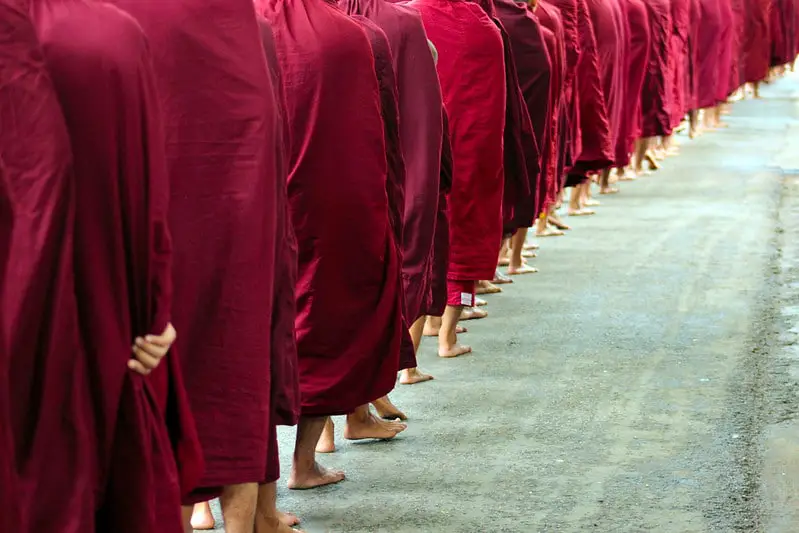Should You Meditate on an Empty Stomach? [benefits]
Recently, I have started to fast regularly. And I wondered how it would affect my meditation practice. Turns out that there are a lot of variables (surprise 😉 ) that affect meditation more than fasting.
It is best to wait 2 to 3 hours after having eaten a meal to meditate, because digestion has the tendency to make us drowsy. And sleepiness is one of the main hindrances to meditation.
Now, we should add some nuance to the general recommendation. There is a lot of variety in people and in meditation styles that should be taken into account.
Let’s dive in.
Meditating on an empty stomach is generally the best way to go
As we all know, we can sometimes feel sleepy after eating. This is perfectly normal in most cases and is rarely cause for concern.
However, when we engage in an activity like meditation, that requires a very high degree of alertness all the while being very relaxing, things change a bit.
The type of meditation you do is important
Broadly speaking, there are 2 types of meditation: concentration meditation and insight meditation. In the west, the best known style of insight meditation is mindfulness meditation. So for simplicity, I will use this style throughout the article.
Concentration meditation on a full stomach

If you are doing concentration meditation (like following the breath or reciting a mantra), all dulness and sleepiness are what are to be avoided at any cost. It is listed as one of the five things that hinder your progress on the road to being a seasoned meditator.
When you reach the pinnacle of meditation, you even need to be able to overcome even the faintest forms of dulness.
Now, for beginning meditators, this is not yet a problem. However, eating large meals does make us very sleepy. It means that everybody should avoid eating a big mel and then start to meditate.
It will make your session so much more enjoyable to not have to fight the tendency to fall over, again and again.
Mindfulness meditation on a full stomach
Now things, change when you move to insight meditation. Especially in mindfulness meditation, where you learn to be at ease with whatever is coming up.
So your sleepiness can be a part of the meditation. Or the feeling of annoyance because you cannot keep awake. Or the soothing feeling you get when you drift off.
I do however not recommend doing this too often as you might get cozy in a semi-dull state that you mistake for meditation. And although you are indeed meditating, you lack the alertness needed to cultivate deeper states of concentration.
On a side note, in the past, I hated it when feeling drowsy in meditation. Until the moment I realized that it was part of the experience and I could look at it mindfully.
That changed everything for me. Looking at the drowsiness in this way made it acceptable, but it also made it vanish. It was a strange problem. I also had a similar experience when applying mindfulness when I was ill. If you want to read more about that experience, you can read it here.
Should you meditate on a full stomach?
I think it is pretty clear that I do not think that meditating on a full stomach is a good idea. It is very detrimental for you concentration practice and you will only get partial benefits when doing insight meditation.
If you only do it once in a while, there is no negative effect, but if you do it repeatedly, your progress will be slowed down.
You can also meditate while hungry

Meditating while hungry is actually an excellent practice.
Yes, at first this can be very distracting. But eventually, you will get the hang of it.
Let’s again make the disctinction between concentration and insight meditation in our discussion.
Hungry concentration meditation
Being hungry while doing concentration meditation does not have the same negative effects than having a full stomach.
You do not get drowsy from being hungry. Mostly it is the opposite. You become highly aware of the hunger and might get cranky.
In concentration meditation, this is to be treated as any other distraction coming up. There are lots of things that compete for your attention when you do concentration meditation. And you need to let them all go.
When you feel that your attention gravitates towards the hunger, just bring it back to you chosen object of mediation. Gently but firmly!
Over time, you will see that you forget entirely about the hunger. This is (although not the aim of the practice), a great insight. Especially for people that have a hard time when hungry.
Hungry insight meditation
In insight meditation, we will not mover away form the hunger. No, we will move towards it.
It is the ideal moment to get to know the hunger firsthand.
So, what does it feel like to be hungry? How does it evolve? It is getting stronger or weaker? And how does it make you feel? Cranky? Annoyed? Proud that you can resist? And what are the associated thoughts?
There is a wealth of information to be gained. I therefore higly recommend doing insight meditation when you are hungry.
Benefits of fasting on meditation

One of the much touted benefits of fasting is that it improves brain function through the production of the brain-derived neurotrophic factor (BDNF.)
In short, this makes you sharper altogether. And that is what we are after!
For first person experience, I can say that, indeed, fasting improves your meditation capabilities.
This comes with a caveat however.
If you are like me, and have side effects from the detoxification that happens when you start fasting, you will actually see that you are able to meditate less well.
Well, especially if you are doing concentration meditation. Obviously, when you do mindfulness meditation, you are less impacted since the withdrawal symptoms will easily catch your attention.
The only thing you need to do, is to stay mindful, whatever you feel in the body. In most cases this is easier than to just follow the breath. However, you need to be brave and look right into the depth of your discomfort. This practice requires some amount of bravery.
Can you eat or drink after meditation?
As I did not know the answer to this question, I tried to find an answer in scientific literature. Unfortunately, I could not find anything.
Intuitively, I would say that there is no effect at all. Just eat when you have finished meditating.
There are however, some traditions that say you need to wait for X minutes before eating. And although I highly respect all the meditation traditions, I will go with my gut feeling here.
However, meditation is an experiential science. So if you feel negative effects of eating after meditation, then stop doing it.
the increased awareness you have from doing the meditation should put you in an ideal position to detect these.
Can you eat or drink while meditating?
Another option, when finished doing your formal sitting practice, or as a standalone practice, it is do eating meditation.
Personally, I find this the hardest form of meditation.
But the fact that it exists answers the question whether or not you can eat while meditating.
However, do not combine those practices. So, do not start eating while doing a concentration practice!
Featured image by Valeria Boltneva from Pexels
Hi, I’m Olivier Devroede and I have been meditating seriously since 2009.
Due to the great benefits I have seen in meditating, I decided to become an MBSR trainer myself and start a blog.


